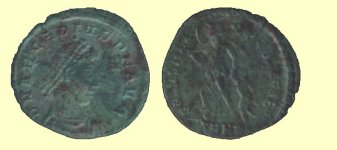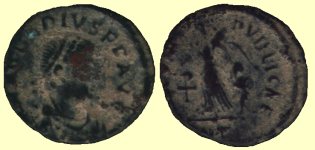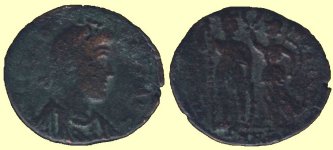
Arcadius 395 - 408 A.D.
By clicking on the pictures you'll be linked to a more complete description of the coin. At the bottom of this page there is a more elaborate biography of the emperor.
 |
Obverse: DN ARCADIVS PF AVG |
| Reverse: SALVS REIPVBLICAE | |
|
Fieldmarks: -
|
|
| Exergue: SMNA |
 |
Obverse: DN ARCADIVS PF AVG |
| Reverse: SALVS REIPVBLICAE | |
|
Fieldmarks: a chi-rho
symbol in the left field of the reverse.
|
|
| Exergue: ANT |
 |
Obverse: DN ARCADIVS PF AVG |
| Reverse: VIRTVS EXERCITI | |
|
Fieldmarks: -
|
|
| Exergue: SMNA |
Arcadius 395 - 408 A.D.
Flavius Arcadius was born in either 377 or 378 in Spain to Theodosius I and Aelia Flavia Flacilla, he had a younger brother called Honorius. Arcadius was proclaimed Augustus in January of 383 at the age of five or six. When Theodosius I went to campaign against Magnus in the late 380's, he placed his son in the care of the Praetorian Prefect of the East, Tatian, who was the de facto emperor in Theodosius' absence. This began a long series of regencies over Arcadius. In January of 395 AD, Theodosius I died and his two sons took "control" of the two halves of the Roman Empire. Arcadius was made emperor of the east and Honorius was given the west to rule. There had been both an eastern and a western emperor since the time of Diocletian, but the empire had always been ruled as if it had been one empire with two halves. And one of the two emperors had always enjoyed seniority over the other. But from 395 on the empire was permanently divided into an eastern and a western half.
Arcadius was a rather weak emperor who was easily controlled by his high government officials and he was never really more than a figurehead. The first one to become the power behind the throne was the Praetorian Prefect of the east, Flavius Rufinus. Rufinus was a devoted Christian who passed several severe laws against pagans, heretics and adulterers. He attempted to marry his daughter off to Arcadius to further his claim to power but failed. Instead Arcadius married Aelia Eudoxia, the daughter of a Frankish general called Bauto. In the mean time the Vandal Stilicho, Theodosius' closest advisor and general, had taken control of Honorius in the west. Both Stilicho and Rufinus were highly ambitious, unscrupulous men and Stilicho claimed that he had been asked by the late Theodosius not only to guard over Honorius but also over Arcadius. The tension between east and west quickly grew when Stilicho, in command of all the eastern and western armies, tried to press his guardianship over Arcadius. The inevitable collision between the two came to a head when the Visigoths under the leadership of Alaric rebelled in the territory in which Theodosius had settled them along the Danube. It was rumored that Rufinus had a hand in Alaric's uprising, who up to then had been a loyal roman officer. The barbarians smashed their way through the Balkans into Macedonia and Greece, devastating all that was in their path. Stilicho now intervened, marching into northern Greece, thereby crossing the line between the two empires, as defined by Theodosius. Rufinus protested against this infringement and demanded Stilicho's immediate withdrawal in Arcadius' name. Surprisingly Stilicho respected the emperors wishes and withdrew, leaving behind, under the command of his Gothic general Gainas, several legions which were to be restored to eastern command. Gainas marched these troops to Constantinople where Rufinus and Arcadius awaited them. With the control of this new field army, it seemed as if Rufinus was going to be more thoroughly in control of the east and of Arcadius. This however wasn't meant to be. When Arcadius and Rufinus came to greet the armies near Constantinople in November of 395, the soldiers turned on the Praetorian Prefect and cut him down in front of the emperor. It appears obvious that this was a plot of Stilicho.
The position of Rufinus, as power behind the throne, now fell to Eutropius, a eunuch, who was the court chamberlain at Constantinople. Most historians of the time agree that Eutropius was a thoroughly crooked man, selling high offices and provincial governors' posts to the highest bidder and having honest rich men accused of treason and put to death just so he could seize their wealth and estates. Since the grand chamberlain could control access to the emperor and commanded the powerful palace bureaucracy, he was well-placed to dictate what and whom the emperor saw and heard. Military officers who dominated the western government, were feared and distrusted by the civil administrators in Constantinople. Eutropius used that fear to his advantage and kept them far away from Arcadius and the circles of power, thus effectively eliminating the military's input in governmental affairs. Arcadius left the governing of the empire to Eutropius and he happily took annual vacations in Galatia, apparently upon Eutropius' suggestion. The chamberlain wasn't all bad he lead a successful campaign against invading Huns in 397/8, for which he won a consulship and the rank of patrician. Tension between the two halves of the empire persisted as Stilicho continued to press for his position as guardian over Arcadius. In 397 Eutropius was forced to formally ask Stilicho for his help to deal with the still marauding Visigoths. Stilicho once again moved to Greece and managed to corner Alaric but for one reason or other he let him escape and Eutropius was forced to pay a bribe to Alaric and make him Magister Militum Per Illyricum (Master General of Illyricum) he also had to give Alaric a place in which to settle his followers. Eutropius blamed Stilicho for this fiasco and declared him a public enemy. By this time, it was hard to determine whether the men that followed Alaric were Roman allied troops following a Roman officer or independent Gothic troops following their king. In an attempt to undermine Stilicho's position and expand eastern domains Eutropius supported the revolt of the Comes Africa, Gildo in 397. This could have meant that the valuable African grain supplies to Rome would have fallen into the hands of the east. The revolt however failed and was the first step in Eutropius' downfall. By 399, the dissatisfaction with east-west affairs and the Gildo fiasco in combination with Eutropius' oppressive system of collecting taxes drove the Ostrogoths to revolt. The revolt was lead by the Gothic count, Tribigild. To prevent any serious damage to the empire Arcadius' army quickly reached an agreement with the rebels and part of the settlement was the dismissal of Eutropius, to which Arcadius agreed. The chamberlain took refuge in the Hagia Sophia, and was exiled to Cyprus but shortly thereafter, in the autumn of 399, Eutropius was recalled, tried and executed in Chalcedon. He wasn't convicted of corruption or having people unjustly murdered but for harnessing the royal white mules to his own carriage which was an act of treason. Tribigild's revolt however ensured that Germanic officers would never again be trusted by the eastern government and would forever be kept out of any important decision-making roles.
The now vacant position of power behind the throne fell to Gainas, the general of Arcadius' armies. Gainas was able to force Arcadius to declare him magister utriusque militiae, or master general of the east. Part of the deal was that Gainas had to move his Gothic troops from Asia Minor into Europe. Soon Gainas' troops filled Constantinople, where they proceeded to intimidate the population. They demanded a church where they could hold services to their pagan gods. This was considered the greatest of insults by the, mostly Christian, citizens of Constantinople who rioted and managed to trap the foreign troops in their church and burn it down around their ears. Gainas managed to flee with the rest of his army but they were drowned when they tried to cross the Hellespont where the Roman navy smashed their boats to pieces. Gainas managed to get away once more but his own head was soon to decorate a pike. Uldin, King of the Huns, captured Gainas and sent his head as a present back to Arcadius in Constantinople.
The next one to become the power behind the throne was Aelia Eudoxia, Arcadius' wife, who had done much to forward her place in the government. In January of 400 AD, she was named Augusta, a singular distinction offered to only three other women in the previous century. Her position thus gained a semi official legitimacy afforded to very few Roman empresses. Arcadius quickly came to some understanding with the west after Gainas' death at the very least they gave Honorius and Stilicho moral support in their increasing problems with Alaric. In 402, these new feelings of goodwill were sealed by a joint consulship between Arcadius and his brother. The emperor also sought to establish his own military prowess and Christian piety with the erection of a column set up in the Hippodrome of Constantinople in 402/3. The column depicted his military victory over Gainas, crowned with a capital emblazoned with the Greek letters chi-rho, symbolizing his devotion to Christ. Arcadius' son, Theodosius II, was born in 401, and was quickly made Augustus at the age of eight months thus assuring his own dynasty. But Arcadius' small successes were largely overshadowed by the feud between Eudoxia and the bishop of Constantinople, John Chrysostom. The bishop was a strong believer in social justice, and he had attacked Eudoxia and many of her friends for the conspicuous luxury in which they lived and displayed themselves. This public feuding between Eudoxia and Chrysostom continued until she had him banished in 404. This however caused a breach between Arcadius and his brother, who had tried to support Chrysostom. Eudoxia's victory over Chrysostom was short-lived, in October of 404, Eudoxia died of a miscarriage. Whatever the reason, her end also signaled a complete retreat into the background by Arcadius and no more governmental initiatives seem to have been taken by the 27-year-old Augustus.
The last years of Arcadius' reign were completely dominated by his Praetorian Prefect of the East, Anthemius. Anthemius worked hard to solve a series of governmental abuses, continued to push for Christianization, and tried to secure the east from attack. Anthemius first seems to have tried to reconcile with the west which led to a joint consulship between Anthemius and Stilicho in 405. Additionally, a number of new laws were passed, curtailing paganism, Judaism and heresy. He tried to make use of the continuing problem of incoming Germanic peoples to combat the Isaurian tribes which had been plaguing Asia Minor since 403. While it failed to halt either group's incursions, it was nevertheless a practical and intelligent strategy. Anthemius also strengthened the walls around Constantinople. The records for the last years of Arcadius' rule are quite spotty, but the emperor himself seems to have completely vanished, even symbolically, from the political scene. In May of 408, Flavius Arcadius died at the age of 31 in the palace of Constantinople of unknown causes. His son Theodosius II succeeded him without any controversy and the government remained unchanged. Arcadius thus left the world much as he entered it: without much significance and overshadowed by more powerful forces.
What happened during Arcadius'
reign however was quite important. With the death of Theodosius,
the two halves of the Roman Empire increasingly went their separate ways, each
half took on the character of a separate empire. The western empire retained
the Latin language, European culture and traditions while the inhabitants of
the eastern empire spoke Greek and adopted a culture combining Greek, Middle
Eastern, and North African elements. For the most part, the west was thrown
back upon its own resources, unable to deal with the problems of the fifth century.
The east proved more compact and more resilient, it largely weathered the political
storms from without and within. Arcadius is therefore often quoted as the first
'Byzantine' ruler. Moreover, Constantinople
became the imperial capital of the east, a Roma nova. The emperor rarely left
the city and the palace officials became more influential than many of the more
theoretically important ministers outside the city. Finally, the hard stance
against Germanic officers in Roman government became a central feature in the
east. While the reasons for this development were inspired largely out of fear
and perhaps racism, the eastern Roman Empire did manage to avoid the destructive
succession of Germanic generals who controlled the west in the fifth century.
It also encouraged the eastern rulers in the following century to take hard
lines against outsiders, including the Isaurians,
the Huns
and the Persians.
For this biography I've used the texts from the following websites:
http://www.imperiumromanum.com/
http://www.roman-emperors.org/
http://www.roman-empire.net/
And from: Gibbon's Decline and fall of the Roman empire.